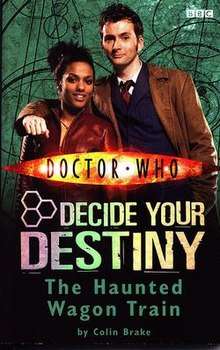The Haunted Wagon Train
The Haunted Wagon Train is a BBC Books adventure book written by Colin Brake and is based on the long-running British science fiction television series Doctor Who. It features the Tenth Doctor and Martha.
 | |
| Author | Colin Baker |
|---|---|
| Series | Doctor Who book: Decide Your Destiny |
Release number | 8 |
| Subject | Featuring: Tenth Doctor Martha |
| Publisher | BBC Books |
Publication date | 4 October 2007 |
| Pages | 128 |
| ISBN | 978-1-4059-0380-6 |
| Preceded by | Dark Planet |
| Followed by | Lost Luggage |
This is part of the Decide Your Destiny series which makes you choose what happens in the books.
Continuity
This book was originally scheduled to be followed by Frozen Earth, but that book was replaced by Lost Luggage.
Reception
As with Colin Brake's two previous Decide Your Destiny books (The Spaceship Graveyard and The Time Crocodile), The Haunted Wagon Train has received some negative reviews.[1]
It was the final book in a second set of four, which were successful enough to allow the range to continue.
gollark: You're running a currency on top of krist, or...?
gollark: In any case, other people could probably help somehow.
gollark: OR DOES HE?
gollark: JACK?
gollark: I don't know.
References
- ""Doctor Who - Decide Your Destiny: The Haunted Wagon Train" by Colin Brake". My Cultural Experience. 2008-06-18.
This article is issued from Wikipedia. The text is licensed under Creative Commons - Attribution - Sharealike. Additional terms may apply for the media files.